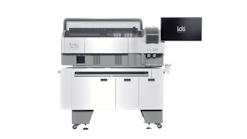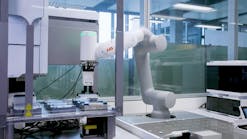Providing solutions in hematology and urinalysis that meet the evolving needs of clinical labs
Professional:
2016–present: current position; 2014–2016: SVP/GM, Siemens Health Care, North America Services; 2000–2013: SVP/GM, Hologic, Inc., Women’s Health Device. Extensive experience in optical engineering and materials companies.
Education:
PhD, Engineering Materials, University of Maryland; BS, Chemistry, University of Maryland
Personal:
I have been married for 32 years, and we have a grown daughter working in Washington, DC. We recently relocated to Miami. I enjoy Washington Redskins football and boats.
What are your primary responsibilities as Senior Vice President, Hematology and Urinalysis, for Beckman Coulter? My primary responsibility is to improve patient care by helping our customer labs operate more efficiently and make better clinical decisions. We do this by continually improving our product offerings in terms of usability, reliability, and cost, and by adding useful clinical indicators. In looking at our customers’ environment, we know that the constant increases in cost pressure, staff shortages, and increased testing loads are not likely to relent soon. So, we must help them meet these challenges with products that alleviate their burdens and provide their clinicians with the right information, faster.
What should clinical lab directors know about hematology solutions offered by Beckman Coulter? Beckman Coulter’s hematology solutions build on the strength of our strong core VCS and Coulter Principle technologies, which have always focused on native-state cellular characterization, thereby improving first pass autovalidation, reducing cost per reportable, and offering a wealth of high-quality diagnostic information. The scientific literature is full of examples of Beckman Coulter hematology instruments offering strong clinical indicators for many conditions, and we believe we can help transfer many of these indicators from research use only to routine IVD use. These expanded clinical insights, combined with workflow and cost advantages, help us offer our customers exactly what is needed to respond to their challenging environment.
What are the benefits of automation in hematology? Automation can provide a host of benefits, including reduction of errors, reduction of manual touches, improved efficiency, and, ultimately, improved patient care. Beckman Coulter offers scalable automation solutions, from our basic DxH Workcell, which intelligently automates hematological analysis and slide making/staining; to our AutoMate series, which handles pre- and post-analytical processing; to our PowerExpress, which handles true multidisciplinary sample analysis and near-zero touches for high-volume laboratories.
Are those benefits applicable to low, medium, and high-volume labs? Labs need to invest in the scale of automation that optimally helps their workflow while meeting their budgetary requirements. Too much automation can cause problems that are different, but just as frustrating, as too little automation. One important area where almost any lab can benefit is with a flexible and powerful middleware solution such as our REMISOL Advance. With this tool, labs can have virtual synergies that require no lab space, but that can simplify and improve patient data review by pulling information together from multiple assays and multiple disciplines.
The need to reduce manual microscopic review, and subjectivity, in urinalysis is much discussed. How has Beckman Coulter addressed this? Urinalysis is evolving from a basic screening test to a much more involved testing panel that mirrors what we do today with blood. Our iQ200 platform features automated particle recognition, which deploys neural networks to improve machine identification and classification of urine particles. The system works by pre-classifying particles and presenting only those particles that require review, thus standardizing the field of view, lighting, and format of data presentation. Additionally, we provide a host of tools and training to improve laboratorian competency and consistency when classifying sediments. Most customers experience a significant reduction in the need for manual microscopic review, saving time and money for the core lab while improving clinical support. Further, the platform works together seamlessly with our iChem Velocity system to provide both urine chemistry and urine sediment analysis in one fully automated instrument.
What are some broad trends in hematology that MLO readers should know about? How are vendors such as Beckman Coulter anticipating these trends? While hematology is often thought of as a mature field, there are several active areas of innovation that promise to change our thinking about standard lab practices. First, we anticipate additional clinical information will be extracted from the wealth of morphological data collected by our analyzers. Our scientific partners have explored and demonstrated clinical utility in research settings, and we look forward to bringing these to the front lines of clinics around the world. Second, there will come a day when there is little need for manual review of slides. The technology exists today. Between our powerful flow cytometry product line and our automated particle recognition technology, we can greatly reduce the need for costly and time-consuming slide reviews, thereby freeing lab staff to focus on critically challenging patients and other parts of their daily work. Third, we expect the informatics revolution to transform hematology, further integrating our cellular analysis with physiological symptoms, chemistry, and immunoassays into a complete patient record to support clinical decisions.
One trend that goes across the benches is the aging workforce. How does today’s technology respond to that reality? All technologies have life cycles. In the field of hematology, early Coulter Counters were remarkable for their ability to perform simple counts rapidly. Over time, the technology has evolved to provide enormous amounts of information about cell structure and function. Now, the challenge will become to make the analysis simpler and simpler while expanding the clinical benefits. Much as mainframe computers have given way to iPhones, Beckman Coulter technologies are being incorporated into smaller, faster, easier-to-use products that have significantly more analytical horsepower than their predecessors. What we foresee is a shift that will greatly reduce the physical burdens of lab work, shorten the time spent on necessary but non-value-added tasks, and provide better ergonomic experiences, thus supporting lab staff members throughout their careers!





